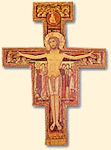
 Most
High, glorious God, enlighten the darkness of my heart, and give me
right faith, certain hope, and perfect charity, wisdom and
understanding, Lord, that I may carry out your holy and true
command. Most
High, glorious God, enlighten the darkness of my heart, and give me
right faith, certain hope, and perfect charity, wisdom and
understanding, Lord, that I may carry out your holy and true
command.
St. Francis' Prayer to Discern
God's Will
said before the San Damiano Crucifix
 What is Spiritual Direction?
What is Spiritual Direction?
Spiritual direction is an interpersonal relationship in which one
person helps another to reflect on his, or her, experiences in light
of the Gospel and Christian wisdom. Through this process individuals
are led and encouraged to discover their unique call in life.

What is the Role of a Spiritual Director?
A spiritual director is one who willingly walks this faith journey
with another. A spiritual director listens, encourages, challenges and
prays with the individual who freely shares the movements of the Spirit
in his life.
Not everyone is in need of spiritual direction in every phase of
life. But it is a helpful means of discernment, especially when an
individual is seeking to discover the will of God in his life. A time of
special direction may be when a person is searching to discover how to
live out his, or her, Christian call to service.

How do I find a Spiritual Director?
Though spiritual direction can and does occur within every community
in the Church, it is not always easy to find a spiritual director. Here
are some general hints:
- Talk to your parish priest. He could give you the names of qualified
priests, religious, or lay people in the diocese whom you could contact.
- Retreat centers, college Newman Centers, and ministries to young
adults are primary places to receive support and a list of individuals
engaged in spiritual direction.
- Offices of continuing education for priests, deacon formation
programs, seminaries, and renewal centers for religious may offer
additional names.

What should I look for in Spiritual Direction?
A spiritual director can help you to be more aware of and respond to
God's revelation as you experience it effectively – that is, in your
emotions, not just in your mind. Thus, spiritual direction deals not
only with the intellect, but the heart as well. In this sense, it is
concerned with the whole person.
A spiritual director can help you express your struggles, pain, joys
and gratitude, and to share these with God; to notice God's presence in
your life and your prayers; to savor, relive, and respond to your
experience of God; and finally, to notice interior changes and the
effects these changes have on your relationships and your life. Such a
task is not easy, even though God is present and active in spiritual
direction and, indeed, is the primary spiritual director.

What should my relationship be with my Director?
For you to share openly about intimate relationships such as those
you have with the people and the God you love, you must have a solid
relationship with your spiritual director. The following five qualities
can help you to solidify that relationship:
- Companionship
. You meet your spiritual director as a companion,
not as a teacher, a master, or a problem-solver. As a midwife
facilitates the birth of a child, so a spiritual director accompanies
you in the growth of your relationship with God.
- Empathy
. As a companion, a spiritual director relates to you with
empathy. In fact, authors on spiritual direction speak of "deep
empathy." By this they mean the spiritual director engages
wholeheartedly in your experience, striving to enter your world as if it
is his or her own.
This empathetic presence means the director allows your struggles,
joys, hopes, and experiences of God to touch him or her effectively. To
do that, among other things, a spiritual director listens actively with
compassion, not passively with detachment.
- Care.
A good spiritual director cares for you deeply and shows it.
The director's love, as God's love, can heal. Almost always such caring
will free you to share your spiritual life more openly, for the
director's care evokes trust and confidence from you. From the beginning
you need to have the feeling that your director considers what you are
sharing to be precious and sacred. As your meetings continue, the
feeling of love and reverence should deepen.
- Naturalness.
Look for a spiritual director who can laugh or cry
spontaneously when something you share calls for such a response. If you
sense your director is not natural, not relaxed, it will no doubt become
a roadblock to the free sharing necessary for fruitful spiritual
direction.
- Commitment.
A director's commitment to you and to your
relationship is essential. There are going to be ups and downs in a
spiritual direction relationship. These are most likely to occur as you
make changes and as you grow which, remember, is the goal of your
encounters. For successful spiritual direction, you must know your
director will stand with you in times of such stress.
The more deeply these five qualities of relationship – companionship,
empathy, care, naturalness, and commitment – are present in spiritual
direction, the more likely it will achieve its primary purpose: helping
you grow in a personal relationship with a loving God. Don't overlook
the fact that you also have responsibilities – to be open, honest, and
committed to your own growth.

What atmosphere should I expect in Spiritual Direction?
Your spiritual director strives to create an environment where you
can notice more clearly God's communication to you and your reaction to
it. Primarily, the spiritual director will do this in two ways: by
fostering a contemplative atmosphere and by using an evocative approach.
- Contemplative atmosphere.
Your spiritual director will seek to
create an atmosphere where you can look at, become absorbed in, relive,
and respond to your experiences of God. In doing this, the director will
try to help you focus on how God is present in your life and prayer and
not on how you think God should be present or will be in the future.
For example, a director might ask, "When you pray, who are you
conscious of – God as Father, Creator, Friend, Jesus, Holy Spirit?" Or,
"How does God seem to be present with you now in your life?" The
director will invite you to look at what is actually happening and to
spend time reflecting on it.
- Evocative approach.
You can expect your director to use an
evocative approach rather than a didactic approach. Your director will
strive to draw out what is happening in your relationship with God. The
idea here is that the director is trying to allow God to stir your mind
and heart instead of instructing you about God and spiritual matters.
A spiritual director taking a didactic approach might teach you about
God as a loving God. A director taking a evocative approach will help
you to be open to the experience of God's personal love for you. Think
of the spiritual director as a stagehand helping to set the stage for
God's activity to take place.
Through an evocative approach your spiritual director allows you to
move at your own pace. Further, this approach enables the director to
help you notice and feel your interior reactions to God's communications
and to share these feelings with God. To a person who has suffered a
painful loss, a director using the evocative approach might say, "How do
you feel as you sense God wanting to be involved in your sorrow? If the
person responds, "I feel comfortable and grateful," the director might
continue, "Did you think of sharing your gratitude with God?" In this
way, the director evokes a dialogue between the person and God that can
continue in the person's prayer.

A Sacred Gift.
Spiritual directors offer a
sacred gift by being a caring companion and fostering a contemplative
presence. If spiritual direction is done well, you will receive the
support you need to pay attention to and respond to God who is already
present and active in your life. What's more, it's very likely that your
relationship with God will grow. And that's a very good thing.
_________
Sources:
L. Patrick Carroll and Katherine M. Dyckman, "The Emergence of
Spiritual Direction," Praying: Spirituality for Everyday Living,
March-April 1989, pp. 5-8.
Maureen Conroy, "What to look for in Your Spiritual Director,"
Praying: Spirituality for Everyday Living, January-February 1990, pp.
9-11.
download
PDF
|
Vocations
Office:
Franciscan Friars, TOR
Third Order Regular of St. Francis
Province of the Most Sacred Heart of Jesus
phone: 814-693-2889 |

|

